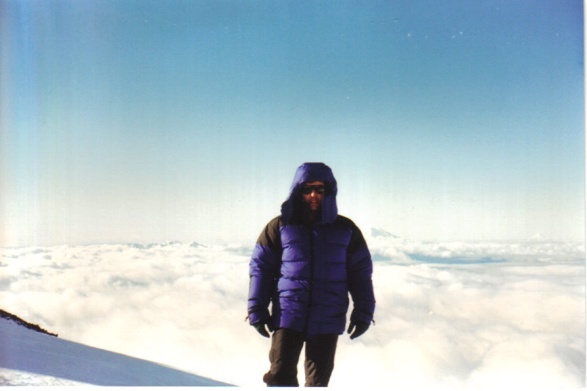| << Chapter < Page | Chapter >> Page > |
 |
 |
|---|---|
| The author is highly susceptible to boredom, so he likes to travel to interesting places. Here we see the author in Mt. Washington’s alpine garden (NH) in winter (top left) and above the clouds on Mt. Rainier, Washington (bottom right), and the author’s son walking in the Great Salt Lake in Utah’s desert (top right). |
 |
| Discussion Question: Which areas of Zuckerman’s sensation seeking trait do you find most interesting, and which subscales do you think you would score high on (they may not be the same)? If there are any subscales on which you think you would score either low or high, what impression do you have of people who have an opposite score on those same scales? |
Grit - Getting Things Done!
Another specific trait that has become somewhat popular recently in higher education has been called grit by Angela Duckworth and her colleagues (see Duckworth et al., 2007). Grit is defined as the perseverance and passion necessary to accomplish long-term goals. In particular, it refers to the ability to continue striving toward those goals despite temporary failure, adversity, and plateaus in one's progress. Although much of the research on grit has focused on academic goals, grit does not correlate well with intelligence. Rather, it correlates highly with the Big-Five trait of conscientiousness.
We used to believe that individuals who become experts in a particular area (whether it's math, playing a musical instrument, playing chess, or competing in athletic events, etc.) had some innate ability or talent for their skill. However, Anders Ericsson proposed and studied a different theoretical framework. Although an individual may show some early talent in a particular domain, what resulted in their becoming an expert, or a star athlete, was the intensive deliberate practice that followed, often taking many years before the individual truly excelled (Ericsson, 2004; Ericsson et al., 1993). Working together, Duckworth, Ericsson, and a few of their colleagues showed that deliberate practice is the key to success in an academic competition that tends to fascinate many people because of just how difficult it is: the National Spelling Bee (Duckworth et al., 2010).
Whether it's grit, consciousness, or the associated behavior of deliberate practice, those who continue to strive toward their goals tend to succeed not only in school, but also in most aspects of life, including life satisfaction and earning a good income (Duckworth&Carlson, 2013; Duckworth et al., 2012). But what can, perhaps, interfere with one's ability and/or motivation to continue striving toward one's goals? It appears that life stress in early adolescence can significantly impair one's ability to strive toward a positive and fruitful future (Duckworth et al., 2013). It's quite possible that since adolescence is the time of developing one's identity, according to Erik Erikson, and identity associated with negative life events and stress is incompatible with maintaining grit.
As I mentioned above, this is an area only recently becoming well-known (i.e., popular) in the field of higher education. It is likely to become an increasingly significant factor in how we work toward helping students achieve their goals, whether academic or in other aspects of their lives.

Notification Switch
Would you like to follow the 'Personality theory in a cultural context' conversation and receive update notifications?